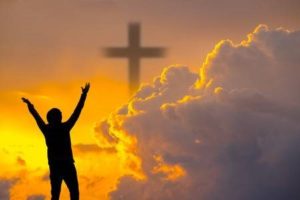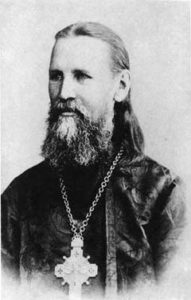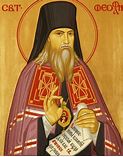SSCORRE!
Saint Sophia Cathedral
Online Resources for our Religious Edification

Topic of the Week – Ecclesiastical New Year, September 1st
“O Word of the Father from before the ages, Who, being in the form of God, broughtest creation into being out of nothing;
Thou Who hast put the times and seasons in Thine own power:
Bless the crown of the year with Thy goodness;
give peace unto Thy churches,
victory unto Thy faithful hierarchs,
fruitfulness unto the earth,
and Great Mercy unto us.”
+ Matins of the Ecclesiastical New Year, Tone 3
Adult/Family:
“One of the things to which we aspire as Orthodox Christians is to be wise and faithful stewards… of using the gifts with which we have been blessed to glorify God and to serve one another… it is often the case we are remiss in setting aside the time we need actually to accomplish these things.
The culture in which we live is obsessed with time. While we are offered “time-saving” devices and methods of every sort, we often find that our days are filled with rushing from one event and activity to another with little or no chance for reflections; that our children are “over scheduled;” that we wish we had forty-eight hours in a day just to meet the demands of daily life.
….Instead of setting aside the first portion of our time for the things eternal, we pursue the material first, reserving the “extra time” so many seem never to have for prayer, fasting, and almsgiving – and all those things that bring and restore a true balance to our lives.
In his Great Kanon, Saint Andrew of Crete laments the many times we “squander” our time in laziness or in “rushing about in vain.” In so doing, he calls us to recognize not only the need wisely to order our time, but to repent when we fail to do so.
On the first day of September, we mark the beginning of the ecclesiastical year. The commemoration itself reminds us of the constant need to re-evaluate and recapture that which is central to our lives as Orthodox Christians, to restore balance in all we do, and in repentance to make an earnest attempt to set aside a portion – the “first portion” – of our time to acquire the peace of the Holy Spirit, without which our “rushing about” is indeed in vain and our lives as Christians is reduced to external formalities, “time permitting.”
May the beginning of this new ecclesiastical year mark a new beginning in our lives as individuals, as families, as parishes… a new beginning by which we set aside, before all else, the time we need to grow spiritually and to respond to the call to live as wise and faithful stewards, not only of our talents and treasures, but of the precious gift of time.”
Excerpted from The Beginning of the Ecclesiastical New Year
Preschool/Elementary:
“It seems odd saying ‘Happy New Year’ in September, but that’s when the Church marks Her annual beginning. September 1st is, for the Church, the first day of a new year.…
Jesus of Nazareth began preaching the good news of His mission on September 1st…. during the month of September the Hebrews entered the promised land. And, the custom of beginning a new year with autumn was common in Biblical and Mediterranean lands because the summer harvest was completed, the crops were stored, and it was a time when people began preparing for a new agricultural cycle. It was an appropriate time for a new beginning. This is evident in the services for the New Year as the Church beseeches God for fair weather, seasonable rains, and an abundance of the fruits of the earth.
As we begin this new year it should be noted that the church calendar is loaded with important events, especially the 12 great feasts, the four fasts, and Pascha. Also, each day of the church year is set aside to honor saints; many of whom died on that particular date. Similar to our personal calendars where we mark the earthly birthdays of family and friends, the Church remembers the saints on their “heavenly birthday” — the day they passed from this life to Paradise.
Liturgically, the church year begins and ends with the Mother of God. The first great feast of the year, September 8, honors her birth; the last great feast of the year, August 15, remembers her falling asleep. Between these two great feasts the Church marks 10 other major Feasts and Pascha, the Feast of Feasts. The dates for Palm Sunday, Pascha, Ascension, and Pentecost vary each year. The Apostles’ Fast can vary in length. It begins on the Monday after All Saints Sunday (the first Sunday after Pentecost) and ends with the feast on June 29. Each parish also celebrates its “altar feast” on the day set aside for its patron saint, feast, or name.
The wall calendars that most parishes make available each fall include many of the daily saints and readings for the year. Also, most people have their own patron saint — or “nameday” — to remember, as well as other favorite and family saints’ days.
Why not start the new ecclesiastical year off right? Mark your personal calendar with the feasts, fasts, and saints days of the Church. Make a resolution to participate in the liturgical cycle of the Church. Unlike mundane New Year’s resolutions, marking your calendar, keeping the feasts and fasts, and embarking for a new life within the annual life of the Church, is a wonderful way to sanctify time. Let’s all join together in making this an “acceptable year of the Lord!”
Excerpted from Happy (Church) New Year!
Read these instructions on how to make this festal timeline for your home and follow these suggestions for activities to celebrate each feast throughout the year.
Festal Icon Timeline
Middle/High School:
“September 1 marks the beginning of the Ecclesiastical New Year, when the cycle of liturgical commemorations begins anew. The existence of this separate New Year’s commemoration, distinct from the civil New Year on January 1, serves as a reminder both to Christians and to the World. The Church, it proclaims, is not bound to the institutions of this world, but rather stands apart from them. The Church, existing in the world but never being of the World, celebrates according to its own calendar and its own traditions, and not according to the World’s schedule.
It is, thus, fitting, that on this same day the Church commemorates Saint Symeon the Stylite, a fifth-century ascetic who confounded the World by setting up his hermitage on top of a pillar in the middle of the market in Aleppo. By publicly living a vigorously Christian life, separate from the worldly conception of success and prosperity, Saint Symeon gave powerful witness to the Gospel, especially of the command “If any man will come after Me, let him deny himself, and take up his cross, and follow Me” (Matt. 16:24).
May this coming year bring boundless opportunities to bear witness to the truth of the Gospel in our increasingly anti-Christian and worldly society. Let us also resolve, with God’s aid, to increase our personal spiritual striving, in prayer, fasting, and repentance.”
Taken from Blessed Ecclesiastical New Year
Does the example of Saint Symeon the Stylite inspire you? What can we do in our lives as Orthodox Christians to ‘exist in the world but not be of this world’?___________________________________________________________
A Message from Maria Spanos
I am passionate about our Orthodox Christian faith and seek to help others learn as much as they can about it. My purpose here is to share online resources that help strengthen our relationship with Christ and bind us closer to His Church. I believe they are invaluable in learning about our precious Orthodox Tradition, and are a great aid for teaching family members, friends and others about Orthodoxy. ~Maria
Two of my favorite quotes:
 “A true Christian behaves in this life so that it may be a preparation for the future one and not only a life here below. In his actions, he does not think what will be said of him here but of what will be said there in heaven; he represents to himself that he is always in the presence of God, of the angels and all the saints, and remembers that someday they will bear witness of his thoughts, words, and deeds.” — Saint John of Kronstadt
“A true Christian behaves in this life so that it may be a preparation for the future one and not only a life here below. In his actions, he does not think what will be said of him here but of what will be said there in heaven; he represents to himself that he is always in the presence of God, of the angels and all the saints, and remembers that someday they will bear witness of his thoughts, words, and deeds.” — Saint John of Kronstadt
__________________________________________________________

“Of all the holy works, the education of children is the most holy.”
— St. Theophan the Recluse






